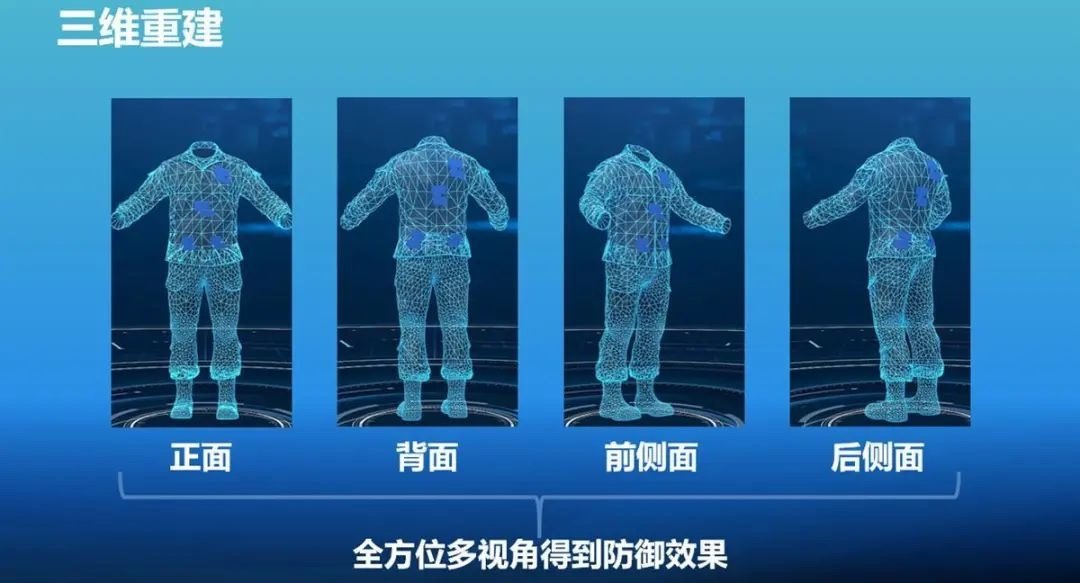At first glance, it may look like an ordinary, run-of-the-mill camouflage coat. However, what a group of Chinese graduate students have actually developed is a cost-effective “invisibility coat” capable of concealing the human body from AI-monitored security cameras, both day and night.
乍一看,它看起来像是普通的,普通的伪装外套。但是,一群中国研究生实际上开发的是一种具有成本效益的“隐形外套”,能够将人体掩盖白天和黑夜的AI监控安全摄像机。
At the forgivable price of just $70 USD, the high-tech jacket, which has been dubbed the “InvisDefense coat,” was crafted by a team of four graduate students from Wuhan University in China. The real-life sci-fi coat secured the top prize at the inaugural “Huawei Cup,” a cybersecurity innovation contest sponsored by the Chinese tech giant Huawei.
高科技外套的价格仅为70美元,被称为“ Invisdefense Coat”,是由来自中国武汉大学的四名研究生组成的团队。现实生活中的科幻大衣在首届“华为杯”上获得了最高奖项,这是由中国科技巨头华为赞助的网络安全创新大赛。
Professor Wang Zheng from the School of Computer Science oversaw the team, comprising doctoral student Wei Hui from the School of Computer Science, along with postgraduates Li Zhubo and Dai Shuyv from the School of Cyber Science and Engineering, and postgraduate Jian Zehua from the Economics and Management School.
计算机科学学院的Wang Zheng教授负责该团队,包括来自计算机科学学院的博士生Wei Hui,以及来自网络科学与工程学院的研究生Li Zhubo和Dai Shuyv,以及经济学和管理学校的研究生Jian Zehua。
The InvisDefense invisibility cloak involves a kind of camouflage pattern designed by a new algorithm, which challenges the efficacy of this commonly used method of AI pedestrian detection. “In layman’s terms, it means cameras can detect you but cannot determine that you are human,” according to a statement released by Wuhan University (WHU).
Invisdefense Invisibility Cloak涉及一种由新算法设计的伪装模式,这挑战了这种常用的AI行人检测方法的功效。武汉大学(WHU)发表的一份声明说:“用外行的话来说,相机可以检测到您,但不能确定您是人类。”
In contrast to stealth fighter jets, which are only invisible to radar, the InvisDefense invisibility cloak renders itself undetectable to machine recognition rather than the naked eye. “Visual neural network refers to machine vision, not visual recognition of humans. It is widely used in video surveillance equipment with the pedestrian detection function and smart cars,” Professor Zheng explained.
与隐形战斗机(仅是雷达看不见的隐形战斗机)相反,隐形的隐形斗篷使其本身无法被机器识别而不是肉眼识别。Zheng教授解释说:“视觉神经网络是指机器视觉,而不是对人类的视觉识别。它广泛用于带有行人检测功能和智能汽车的视频监视设备中。”
The all-weather InvisDefense coat is visible to the human eye. However, to cameras, specific camouflage patterns disrupt the visual neural network during the day, while at night, InvisDefense incorporates temperature control materials, allowing stealth protection from thermal infrared imaging through distinct color blocks.
人眼可见全天候的防御外套。但是,对于相机,特定的伪装模式在白天破坏了视觉神经网络,而在夜间,Invisdefense融合了温度控制材料,从而可以通过不同的色块进行防热红外成像的隐身保护。
An innovative defense product, the InvisDefense invisibility cloak offers a potential new means to safeguard personal privacy and security. However, there are also concerns that arise from the development of such technology; the design of the coat could potentially confuse certain detection systems employed in self-driving cars and similar technologies.
Invisdefense Invisibility Cloak是一种创新的防御产品,为保护个人隐私和安全提供了一种潜在的新手段。但是,这种技术的发展也引起了人们的关注。外套的设计可能会混淆自动驾驶汽车和类似技术中采用的某些检测系统。
During tests of the coat using on-campus security cameras, the accuracy of human detection saw a reduction of 57 percent. The researchers noted that one of the first challenges in developing the coat was finding a balance to deceive both the camera and the human eye.
在使用校园安全摄像头对外套进行测试期间,人类检测的准确性减少了57%。研究人员指出,开发外套的第一个挑战之一是找到平衡欺骗相机和人眼。
“Nowadays, many surveillance devices can detect human bodies. Cameras on the road have pedestrian detection functions and smart cars can identify pedestrians, roads and obstacles,” Professor Wang told the South China Morning Post.
“如今,许多监视设备可以检测到人体。道路上的摄像机具有行人检测功能,智能汽车可以识别行人,道路和障碍,”王教授告诉《南中国晨报》。
“Our InvisDefense allows the camera to capture you, but it cannot tell if you are human.”
“我们的Invisdefense允许相机捕获您,但无法确定您是否是人类。”
Outside of the consumer trends that may potentially evolve from this technology, Professor Wang Zheng noted the invention may likely find possible applications in stealth military uniforms to evade detection from drones or AI units.
王郑教授指出,除了可能从这项技术中发展的消费趋势之外,本发明可能会在隐形军装中发现可能的应用,以逃避从无人机或AI单元中逃避发现。
Furthermore, he notes that the algorithm could prove valuable in AI research, primarily by allowing researchers to more fully identify potential vulnerabilities.
此外,他指出,该算法在AI研究中可能很有价值,主要是通过允许研究人员更充分地识别潜在的脆弱性。
Chrissy Newton is a PR professional and founder of VOCAB Communications. She hosts the Rebelliously Curious podcast, which can be found on The Debrief’s YouTube Channel. Follow her on X: @ChrissyNewton and at chrissynewton.com.
克里斯西·牛顿(Chrissy Newton)是PR专业人士,也是词汇通讯的创始人。她主持了叛逆的好奇播客,可以在汇报的YouTube频道上找到。在X上关注她:@chrissynewton和Chrissynewton.com。

